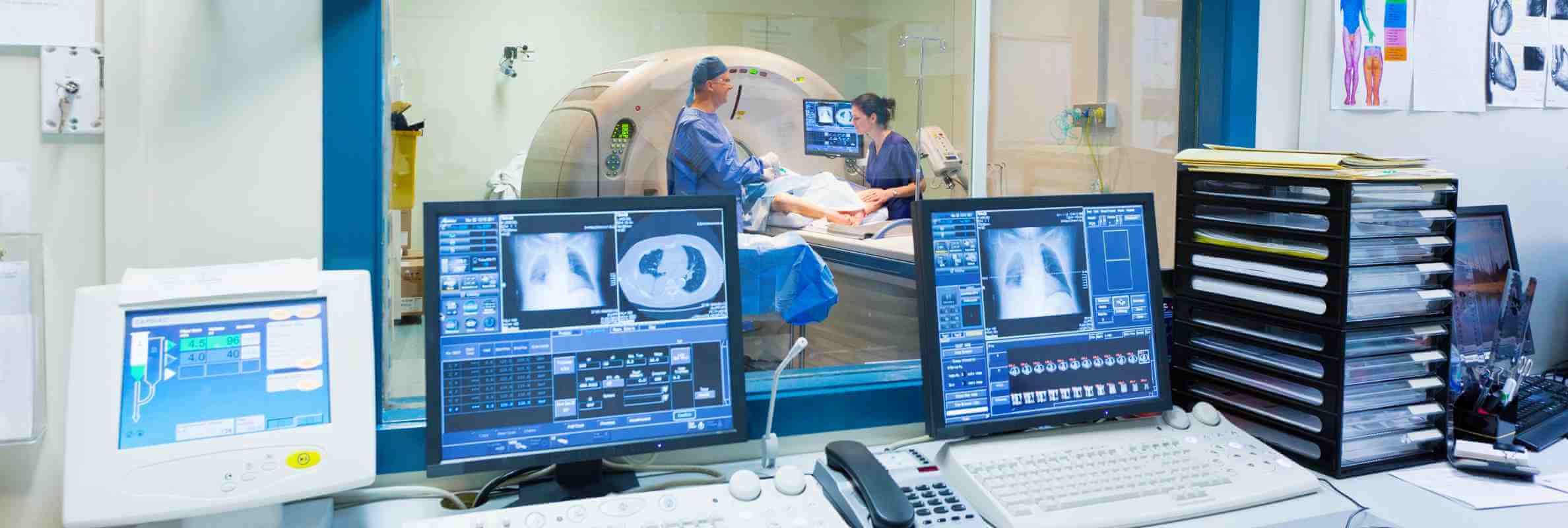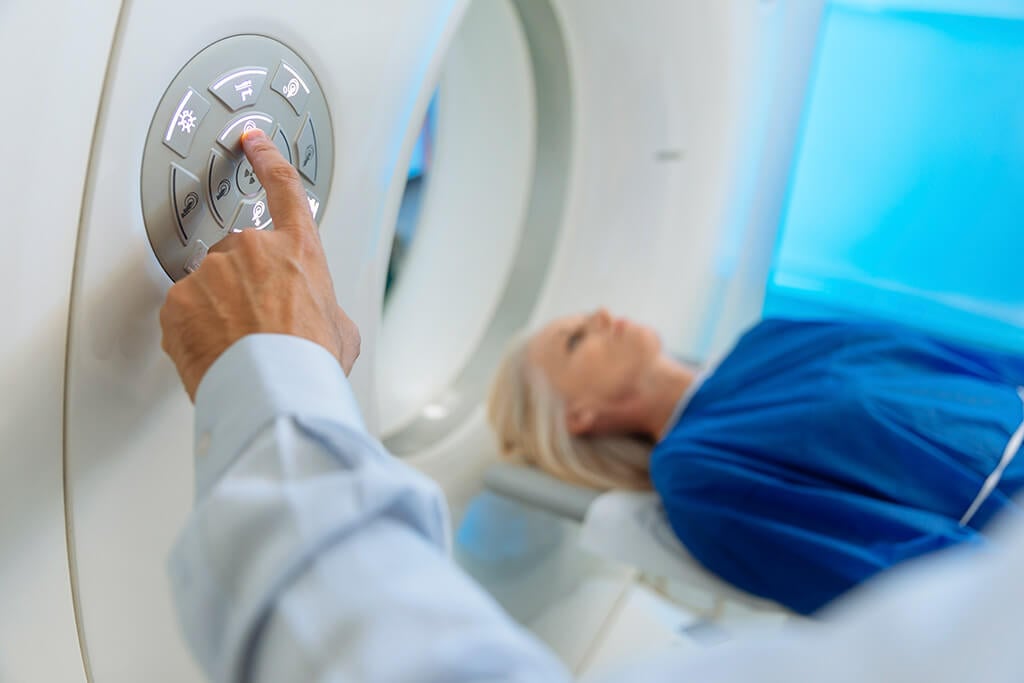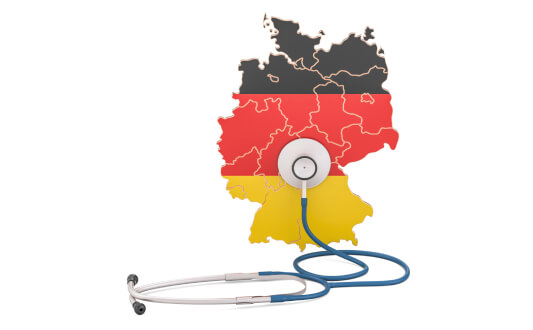In developed countries, such as Germany, the MRI method is increasingly used to visualize internal organs and tissues. It makes possible to receive the 3D image by the sections of tissues up to 1 mm. That is why it allows to diagnose various pathologies even at the early stages. The informative value of MRI surpasses the majority of existing methods in obtaining images of internal organs.
Content
- Which organs can be examined?
- How is the examination carried out?
- Is MRI safe?
- Contraindications
- The advantages of performing MRI in Germany
Which organs can be examined?
Almost all areas of the human body can be examined with the help of the MRI. This method is extremely helpful for healthcare professionals, because it perfectly "sees" soft tissues. In addition, it distinguishes them. The MRI allows doctors to assess the functional state of organs and the degree of their blood supply. The method reveals both solid and liquid formations. Due to the MRI, liquids can be distinguished. For example, a doctor can differentiate a cyst from a hematoma (hemorrhage).
In Germany, an MRI scan can examine almost the whole human body including the following parts:
- The brain
- The spine
- Joints
- Organs of the small pelvis, thoracic or abdominal cavity
- Soft tissues and vessels of the neck
- Hepatobiliary system and pancreas
- Limb soft tissues
- Orbits and optic nerves
The MRI is inferior to X-ray methods only in the visualization of bone structures. In other aspects it surpasses them. Thanks to this technique, thousands of different diseases accompanied by violation of the structure and function of internal organs or musculoskeletal system structures can be detected.
How is the examination carried out?
A person enters the room. Before that, he takes off his outer clothing. The doctor must be sure that there are no metal objects in the human body. For this reason, a specialist can ask a patient to go through the door frame metal detector. Then the patient lies down on the couch. It is moved inside the tomographic capsule. The scanning process begins. The procedure is not accompanied by any subjective sensations. A person just hears a sound which is produced by the device. A person usually does not feel any discomfort inside the capsule, because there is sufficient light and air ventilation there. If necessary, the patient can contact the doctor with the help of a special talking device. Only the need for temporary motionless causes the inconvenience. But most people easily cope with this task.
Is MRI safe?
An MRI scan, in contrast to X-ray, does not use gamma rays. Therefore, the human body is not irradiated. The MRI is completely safe. It can be conducted unlimited number of times, including the short time intervals, if necessary.
Contraindications
The only absolute contraindication to the MRI is presence of any object with metal elements in the patient's body. These can be various orthopedic devices, pacemakers, artificial joints, vascular clips, insulin pumps, etc. Under the influence of a magnetic field metal objects in the patient's body may heat up and shift causing burns and traumatizing surrounding tissues.
Contraindications that complicate performing the MRI in Germany are:
- Hyperkinesia
- Epilepsy
- Psychological disorders
- Severe pain syndrome, including lumbalgia
- Claustrophobia (fear of the enclosed space)
- Convulsive syndrome
- First trimester of pregnancy
The advantages of performing MRI in Germany
Today an MRI can be performed in almost any country. But application of this technique in German clinics has a number of advantages.
Only modern devices are used in Germany. There are different types of MRI devices. According to the generated magnetic field strength, they can be:
- Low-field
- Super low-field
- High-field
- Ultra-high-field
- Medium-field
Many clinics in developing countries use low-field devices. They create a weak magnetic field. Therefore, these devices do not allow the doctor to examine many organs and tissues. There are mainly high-field and ultra-high-field MRI devices in German clinics. They make it possible to accurately visualize even the smallest changes in the human body and to diagnose pathology at the early stages.
Thanks to modern tomographs, the examination takes less time. Therefore, while scanning, a person does not have to lie in a capsule for a very long time.
Highly qualified specialists. It is not enough just to make qualitative images. Doctors need to figure them out! Thanks to the high qualification of German doctors, who graduate from the best European universities, you can be firmly confident regarding the reliability of the diagnosis.
Different types of the MRI in Germany. The most effective types of the MRI for the diagnosis of various groups of pathologies are widely used in German medical institutions. These types are the following:
- Functional MRI. It assesses hemodynamic (blood flow) reactions in the brain or spinal cord. With the help of this study a doctor can identify which functions of the CNS are preserved and active.
- MRI with the contrast enhancement, including the dynamic amplification, which involves the injection of contrast medium directly during the examination. In this way, the pathology of blood vessels, central nervous system, urinary tract, pancreatic and hepatic ducts can be diagnosed. Due to the dynamic MRI, malignant tumors can be detected, because tumors quickly accumulate the contrast medium.
- MRI with fat suppression. It is used for detection of formations, which contain adipose tissue. For example, lipomas can be revealed this way.
- MR-spectroscopy. Hydrogen or phosphoric spectrography is used. It makes possible to detect various signals that come from metabolites — chemical compounds, formed as a result of metabolism. This type of MRI reveals changes in organs at the biochemical level.
- MR diffusion. It gives the opportunity to assess the movement of fluid in the tissues. It allows to identify the injured areas of the brain in ischemia (low blood circulation) presence. MR-perfusion is also used. It identifies changes at the level of microcirculation. Therefore, it allows to diagnose ischemic brain damages at the early stages.
If necessary, MR tomographs with an open contour are used in German clinics. They allow to conduct kinematic studies of joints. Scanning is carried out at various degrees of flexion and extension, which makes it possible to assess the mobility of the joint, the structure of soft tissues (muscles, ligamentous apparatus, tendons, etc.).
Possibility of carrying out an MRI scan under the sedation. Some patients can not lie still for 30 minutes. There are many reasons for this. For example, their muscles make involuntary movements or the patient may have claustrophobia. As a result, the patient feels uncomfortable inside the MRI capsule. Some children also can't lie still for a long time. The patient may have a spine pathology and, while lying on the back, he may feel pain, etc. In such cases German specialists use MRI under sedation. While the patient is asleep, the MRI device continues scanning his body.
You can use services of the company Booking Health to go through the MRI scanning in Germany. We will arrange a trip abroad and necessary check-up for you. Our patient case managers and consulting physicians will select the best clinic, where you can undergo MRI scanning. You will receive our support in getting visa, assistance with documents translation, transfer from the airport to the clinic and back to the airport, and many other services.
Choose treatment abroad and you will for sure get the best results!
Authors:
This article was edited by medical experts, board-certified doctors Dr. Nadezhda Ivanisova, and Dr. Bohdan Mykhalniuk. For the treatment of the conditions referred to in the article, you must consult a doctor; the information in the article is not intended for self-medication!
Our editorial policy, which details our commitment to accuracy and transparency, is available here. Click this link to review our policies.
Sources:
Read:
Why Booking Health - questions and answers
How to make right decision when choosing the clinic and specialist
7 reasons to trust to the rating of clinics on the Booking Health portal
Don't know where to start?
Contact Booking Health







